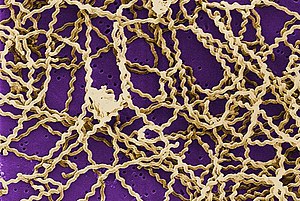 Leptospirosis is a bacterial disease that affects humans and animals. It is caused by bacteria of the genus Leptospira. In humans, it causes a wide range of symptoms, and some infected persons may have no symptoms at all. Symptoms of leptospirosis include high fever, severe headache, chills, muscle aches, and vomiting, and may include jaundice (yellow skin and eyes), red eyes, abdominal pain, diarrhea, or a rash. If the disease is not treated, the patient could develop kidney damage, meningitis (inflammation of the membrane around the brain and spinal cord), liver failure, and respiratory distress. In rare cases death occurs. Many of these symptoms can be mistaken for other diseases. Leptospirosis is confirmed by laboratory testing of a blood or urine sample.
Leptospirosis is a bacterial disease that affects humans and animals. It is caused by bacteria of the genus Leptospira. In humans, it causes a wide range of symptoms, and some infected persons may have no symptoms at all. Symptoms of leptospirosis include high fever, severe headache, chills, muscle aches, and vomiting, and may include jaundice (yellow skin and eyes), red eyes, abdominal pain, diarrhea, or a rash. If the disease is not treated, the patient could develop kidney damage, meningitis (inflammation of the membrane around the brain and spinal cord), liver failure, and respiratory distress. In rare cases death occurs. Many of these symptoms can be mistaken for other diseases. Leptospirosis is confirmed by laboratory testing of a blood or urine sample.This bacterial disease is transmitted by the urine of an infected animal and is contagious as long as it is still moist. Although rats, mice and voles are important primary hosts, a wide range of other mammals including dogs, deer, rabbits, hedgehogs, cows, sheep, raccoons, possums, skunks, and even certain marine mammals are also able to carry and transmit the disease as secondary hosts. Dogs may lick the urine of an infected animal off the grass or soil, or drink from an infected puddle. Here in the Philippines, the major carrier of this bacteria are the rats.
The time between a person's exposure to a contaminated source and becoming sick is 2 days to 4 weeks. Illness usually begins abruptly with fever and other symptoms. Leptospirosis may occur in two phases; after the first phase, with fever, chills, headache, muscle aches, vomiting, or diarrhea, the patient may recover for a time but become ill again. If a second phase occurs, it is more severe; the person may have kidney or liver failure or meningitis. This phase is also called Weil's disease. The illness lasts from a few days to 3 weeks or longer. Without treatment, recovery may take several months.
The disease is usually treated with antibiotics like penicillin and doxycycline which is given at the early stage. However, intravenous medications are given to those who are at the severe stages already. Those who are experiencing symptoms must consult to the near health provider for immediate action to treat the infection.
To reduce the risk of this outbreak, people should avoid wading through the waters especially if these are floodwater as these might be contaminated with rats' urine. If getting through the water cant be avoided, one should wear protective foortwear or clothing for necessary protection.
Be responsible enough to take care of your own health. It is impractical to get sick nowadays.











1 comment:
Need proper diagnostic set ups and patients must check up promptly and early for leptospirosis; or else leads to multi organ disorder to multiple organ failure.
Post a Comment